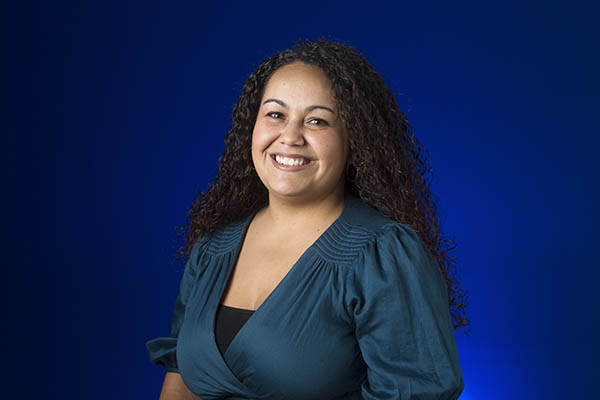Joe Gutierrez Office of Strategic Communication (909) 537-5007 joeg@csusb.edu


With the launch of the Coyote Basic Needs website in spring quarter, Cal State San Bernardino continues to advance its initiative to meet students’ basic needs, and has hired its first basic needs coordinator to move the project forward.
Natalie Cleary, who assumed her role of basic needs coordinator this fall, will manage the university’s food security program, including the Obershaw DEN food pantry and the DEN at the Palm Desert Campus (PDC), CalFresh outreach, and SNAP Ed programs.
Cleary will also serve as a student advocate, connecting students to appropriate university resources and services; work with University Advancement to cultivate donors, grants and gifts; work collaboratively with on- and off-campus partners to secure temporary and long-term stable housing for homeless students; serve as part of the university’s CARE Team (Campus Assessment, Response and Education); and deliver campus-wide educational programs and outreach.
“I am really excited to be the first basic needs coordinator at CSUSB. Being the first means I can really build the program from the ground up with students’ needs in mind,” said Cleary, who has been working at the university since 2001 and is a CSUSB alumna. “It also shows the campus’ commitment to assist students in reaching their educational goals, and I’m happy to work directly under Dr. Paz Olivérez, vice president for Student Affairs, who supports this important work.”
The Coyote Basic Needs initiative at CSUSB is part of the California State University (CSU) system-wide Basic Needs Initiative, which launched in 2016 to support students who are facing food, housing and financial insecurity. The initiative’s goal is to increase support and resources for students who face material hardship to increase holistic student success, which is associated with having their basic needs met.
“There is such a high need for these types of student services that make a huge impact on students,” Cleary said. “Many of the other CSUs have hired a basic needs coordinator and it has become best practice to consolidate and streamline services.”
According to a CSU report released in 2016, estimates indicate that nearly one in four CSU students are facing food insecurity. At CSUSB, data estimates about 37 percent of students face food insecurity.
Some of CSUSB’s efforts in addressing this need include expanded services offered at the Obershaw DEN food pantry, which opened in 2015, creating a new food pantry at PDC, which opened this past May, providing CalFresh outreach and enrollment support, building a campus community garden, providing an option for CSUSB meal-plan holders to donate meals, and providing meal packs for students. In the last year, the Obershaw DEN had 1,603 visits and distributed 1,501 meal kits to students in need.
According to CSUSB data, about 10 percent of students will face homelessness this year. For students struggling to maintain stable housing, the CSUSB CARE Team is available to assist and provide support to those in need of temporary, emergency housing options. In 2018-19, CSUSB provided 464 days of emergency housing for homeless students and 322 days in 2017-18.
Emergency loans and similar resources are also available to students facing an unexpected financial crisis or need.
“There is a lot of research that shows these basic needs affect student success, graduation and retention, thus the need for coordinated comprehensive services,” Cleary said. “Having professional staff dedicated to addressing these significant numbers is important for our Graduation Initiative 2025.”
Cleary has served on CSUSB’s campus-wide Basic Needs Committee since it was created in 2016, and assisted with coordinating services at the Obershaw DEN and the opening of the DEN at PDC. In addition, while working in the Department of Housing & Residential Education in 2017, she coordinated the emergency housing program, served on the CARE Team and assisted residents struggling with financial security, academic progress and wellness.
With her experience helping students in need, Cleary is prepared to push the university’s basic needs initiative forward by setting a number of goals.
“During this first year I want to work on building up additional resources for students to access, especially at PDC,” she said. “I have ideas that include expanding services to add a pop-up mobile pantry, farmers market, extending the emergency housing program and educating student about the services available.”
Campus resources for CSUSB students can be located on the university’s Coyote Basic Needs website.
To make a donation to support CSUSB students in need, visit the Coyote Basic Needs website. Donations may also be made directly to the Obershaw DEN via Amazon.
To reach CSUSB’s basic needs coordinator, contact Natalie Cleary at (909) 537-3993 or ncleary@csusb.edu.